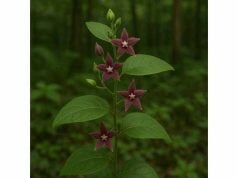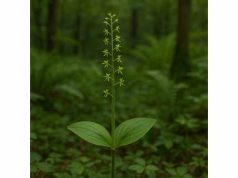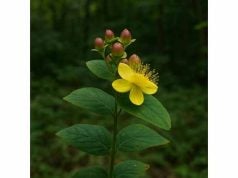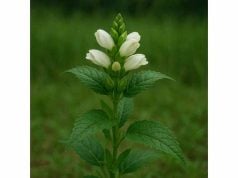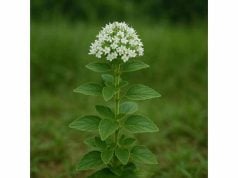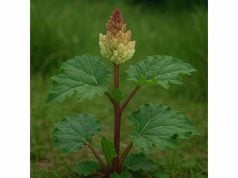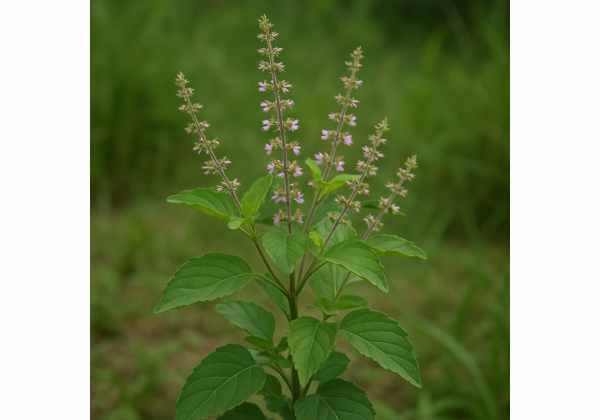
Tulsi, also known as Holy Basil, is a revered herb in Ayurveda, celebrated for its extensive health benefits and versatile medicinal properties. Packed with potent active compounds such as eugenol, ursolic acid, and rosmarinic acid, Tulsi supports immune function, reduces stress, and promotes respiratory and cardiovascular health. Its antioxidant, anti-inflammatory, and antimicrobial properties make it an invaluable ally in maintaining balance in daily life. Used traditionally in teas, extracts, and culinary preparations, Tulsi is also an essential ingredient in natural skincare products. In this comprehensive article, we explore Tulsi’s botanical characteristics, phytochemical profile, health advantages, practical uses, scientific research, and answer frequently asked questions to guide its effective and safe use.
Table of Contents
- Botanical Overview and Identification
- Phytochemical Profile and Active Compounds
- Health Benefits and Core Properties
- Practical Applications and Safety Considerations
- Research Insights and Key Findings
- FAQ: Common Questions and Answers
Botanical Overview and Identification
Tulsi (Ocimum sanctum or Ocimum tenuiflorum) is an aromatic perennial herb belonging to the Lamiaceae family. Widely known as Holy Basil, it has been cultivated in the Indian subcontinent for over 3,000 years and holds immense cultural and spiritual significance. The plant typically features vibrant green, ovate leaves with a slightly serrated margin and an unmistakably aromatic fragrance that intensifies upon bruising. Its slender, erect stems give way to clusters of small, purple to white flowers that attract pollinators, such as bees and butterflies.
Tulsi thrives in warm, humid climates and is commonly found growing in home gardens and temple grounds, where it is often nurtured with great reverence. This herb prefers well-drained soils under full sun exposure, although it can tolerate partial shade. In addition to its ideal growing conditions, Tulsi’s deep, fibrous root system enhances its resilience against periodic drought, ensuring a steady supply of its therapeutic leaves year-round.
The botanical characteristics of Tulsi extend beyond its physical allure; its strong aroma is a direct indicator of the rich essential oils present within its leaves. These oils not only contribute to its widespread culinary and medicinal use but also reinforce its role in traditional rituals and spiritual practices. In Ayurveda, Tulsi is often referred to as the “Queen of Herbs” due to its ability to balance various physiological functions and provide robust protection against pathogens.
Historically, Tulsi has been used both as a medicinal remedy and as a spiritual symbol. Ancient texts mention its use for treating respiratory disorders, digestive imbalances, and stress-related ailments. Additionally, Tulsi has been integral in Hindu rituals, where its leaves are offered to deities and used to purify spaces during religious ceremonies. Its revered status is underpinned by centuries of empirical observations and traditional knowledge, which continue to be validated through modern scientific research.
Today, Tulsi’s adaptability has led to its global cultivation, and it is now grown in numerous countries outside its native habitat. Whether integrated into modern health regimens or preserved as part of traditional practices, Tulsi remains a vital herb admired for its unique combination of beauty, resilience, and healing power. This botanical overview provides a foundation for understanding the multifaceted role Tulsi plays in both nature and human culture.
Phytochemical Profile and Active Compounds
Tulsi’s therapeutic excellence is largely attributed to its diverse and potent phytochemical composition. Scientific studies have identified an array of bioactive compounds in Tulsi, each contributing to its overall medicinal properties. Below is an overview of the key active constituents that underpin its health benefits:
- Eugenol
Eugenol is the principal compound responsible for Tulsi’s distinctive spicy, clove-like aroma. This phenolic compound exhibits potent anti-inflammatory, analgesic, and antimicrobial properties. It helps in reducing inflammation and oxidative stress, thereby supporting pain relief and enhancing immune function. - Ursolic Acid
A naturally occurring triterpenoid, ursolic acid provides significant anti-inflammatory and antioxidant effects. It aids in protecting cells from free radical damage, supports cardiovascular health, and has been researched for its potential role in inhibiting tumor growth and metastasis. - Rosmarinic Acid
As a powerful antioxidant, rosmarinic acid neutralizes free radicals and reduces oxidative stress. It contributes to Tulsi’s anti-allergic and anti-inflammatory functions, making it beneficial for treating respiratory conditions and skin irritations. - Linalool
Linalool is a monoterpene alcohol known for its calming and sedative effects. It supports stress relief and mood enhancement while also possessing mild anti-inflammatory and analgesic properties. Linalool’s presence makes Tulsi a popular choice in aromatherapy to promote relaxation and improve sleep quality. - Beta-Caryophyllene
This bicyclic sesquiterpene not only contributes to the herb’s aroma but also acts as a selective agonist for the cannabinoid receptor type-2 (CB2). Beta-caryophyllene exhibits anti-inflammatory and analgesic benefits and has potential applications in pain management and immune modulation. - Methyl Chavicol (Estragole)
Present in smaller quantities, methyl chavicol adds a subtly sweet and anise-like flavor to Tulsi. It plays a role in antimicrobial activity and is associated with various health benefits, including improved digestion and reduced risk of infections. - Apigenin
A well-known flavonoid, apigenin contributes to Tulsi’s anti-inflammatory and antioxidant effects. It supports cellular repair, reduces anxiety, and has been studied for its potential anticancer properties due to its role in inhibiting tumor growth. - Vitexin
Vitexin, another flavonoid component, exhibits antioxidant and neuroprotective properties. It aids in reducing oxidative damage and contributes to overall cellular health, as well as cognitive function. - Ocimumosides
Unique to Tulsi, ocimumosides are glycosidic compounds that contribute to its immunomodulatory properties. They help enhance the body’s defense mechanisms and support overall wellness by modulating inflammatory responses.
The synergy between these bioactive compounds is what endows Tulsi with its remarkable healing capabilities. The potent mix of antioxidants, anti-inflammatory agents, and essential oils not only supports physical health by reducing inflammation and oxidative stress but also contributes to mental well-being by alleviating stress and enhancing mood.
Ongoing research into Tulsi’s phytochemistry continues to unveil additional components that may further explain its broad therapeutic effects. By combining traditional Ayurvedic wisdom with modern scientific techniques, researchers are now able to validate and quantify the benefits of Tulsi, establishing it as a cornerstone of natural medicine and holistic health practices worldwide.
Health Benefits and Core Properties
Tulsi is esteemed not only for its aromatic charm but also for its extensive array of health benefits. Over centuries, it has been integrated into traditional medicine, and modern clinical studies have increasingly substantiated its role as a natural remedy for a wide range of conditions. Here, we delve into the core health benefits and properties that make Tulsi a vital herb in holistic wellness.
Stress Relief and Mental Clarity:
Tulsi is renowned for its adaptogenic properties, which help the body resist stress and restore balance. The calming effects of linalool, along with other volatile oils, have been demonstrated to reduce cortisol levels and promote relaxation. Regular use of Tulsi, whether in herbal teas or essential oil form, is associated with improved mental clarity, reduced anxiety, and enhanced cognitive performance.
Immune System Support:
The immunomodulatory effects of Tulsi are attributed to compounds such as ocimumosides and rosmarinic acid. These components bolster the body’s natural defense mechanisms, helping to ward off infections and maintain overall health. Tulsi is often incorporated into daily wellness routines to enhance resistance to common illnesses, particularly during seasonal changes.
Antioxidant Protection:
Tulsi’s high concentration of antioxidants—including eugenol, rosmarinic acid, and various flavonoids—plays a crucial role in neutralizing harmful free radicals. This antioxidant activity not only protects cells from oxidative damage but also contributes to the prevention of chronic diseases such as cardiovascular disorders, diabetes, and certain cancers. Its ability to mitigate oxidative stress supports long-term health and longevity.
Anti-Inflammatory and Analgesic Effects:
Inflammation is a common underlying factor in many chronic conditions, and Tulsi’s potent anti-inflammatory properties are widely recognized. The synergistic effects of ursolic acid, beta-caryophyllene, and apigenin help to reduce inflammation and alleviate pain. Whether used as an ingestible extract or applied topically, Tulsi offers a natural means of managing inflammatory conditions and reducing discomfort associated with arthritis, muscle strains, and headaches.
Respiratory Health:
Tulsi has traditionally been used to support respiratory function. Its expectorant properties help clear congestion and promote easier breathing, making it a natural remedy for coughs, colds, and bronchitis. The essential oils in Tulsi, combined with its antimicrobial attributes, work to soothe irritated airways and reduce inflammation in the respiratory tract.
Digestive Wellness:
Tulsi plays a beneficial role in digestive health by stimulating appetite and promoting efficient digestion. It aids in relieving indigestion, gas, and bloating while supporting a healthy gut microbiome. Its mild carminative properties help reduce digestive discomfort and improve nutrient absorption, contributing to overall gastrointestinal well-being.
Cardiovascular Support:
Research has shown that Tulsi can play an important role in maintaining cardiovascular health. Its antioxidant and anti-inflammatory properties support healthy blood pressure levels, improve lipid profiles, and strengthen the heart’s ability to manage stress. Regular consumption of Tulsi is linked to a reduction in the risk of heart disease and improved overall circulatory function.
Skin and Hair Health:
Tulsi is also valued in dermatology and natural cosmetology. Its antimicrobial and antioxidant properties contribute to the treatment of skin infections, acne, and other inflammatory skin conditions. When used in topical applications, Tulsi helps to soothe irritated skin, promote wound healing, and reduce the appearance of blemishes. Additionally, its nourishing properties support healthy hair growth and scalp condition.
The comprehensive health benefits of Tulsi make it a true “elixir of life.” Its integrative properties not only address physical ailments but also support mental and emotional well-being, providing a holistic approach to health. By mitigating stress, enhancing immunity, and protecting against oxidative damage, Tulsi serves as an essential component of a balanced, natural lifestyle. The convergence of traditional Ayurvedic insights with contemporary scientific research continues to highlight its potential in preventive health care and integrative medicine.
Practical Applications and Safety Considerations
Tulsi has found a multitude of uses in daily life, spanning culinary, medicinal, and cosmetic applications. Its broad versatility makes it an appealing addition to various health and wellness routines, but proper usage and precautions are crucial to maximizing its benefits.
Culinary Applications:
Tulsi leaves are a popular ingredient in many traditional dishes and beverages. They can be used fresh or dried in teas, soups, and salads, lending a subtle spicy and slightly bitter flavor that enhances both taste and nutritional value. In many Indian households, Tulsi tea is consumed daily to boost immunity and promote calmness, while its leaves are also used as a natural garnish in cooked dishes.
Herbal Remedies and Supplements:
Tulsi is widely available in various forms such as capsules, tinctures, powders, and essential oils. As an herbal remedy, it is often used to treat conditions like colds, coughs, digestive disorders, and stress-related ailments. For internal use, standardized extracts are popular for their consistency and potent bioactive content. When preparing your own Tulsi tea or infusion, a common recommendation is to steep 5–6 fresh leaves or 1 teaspoon of dried leaves in boiling water for 10 minutes, then strain and enjoy.
Aromatherapy and Essential Oils:
Tulsi essential oil is highly valued in aromatherapy for its calming and balancing properties. Diffusing Tulsi oil in a room or adding a few drops to a personal inhaler can help alleviate stress and anxiety. Additionally, Tulsi oil is often blended with other essential oils such as lavender or sandalwood to enhance its therapeutic effects and create a soothing, harmonious atmosphere.
Topical Applications in Skincare:
Due to its anti-inflammatory, antimicrobial, and antioxidant properties, Tulsi is an excellent ingredient in skincare products. When diluted in a carrier oil such as coconut or jojoba oil, it can be used as a spot treatment for acne, minor wounds, or insect bites. Many natural skincare formulations also incorporate Tulsi extracts to help reduce redness, improve skin clarity, and slow the signs of aging.
Dosage and Administration Recommendations:
For internal use, it is recommended to start with small doses, especially if you are new to Tulsi, and gradually increase based on your body’s response. A typical guideline is to consume one cup of Tulsi tea daily or follow the dosage instructions provided on standardized supplements. For topical use, a patch test is advisable to ensure that sensitive skin does not react adversely. Always adhere to product-specific directions or consult a qualified herbalist for personalized recommendations.
Safety Precautions and Contraindications:
While Tulsi is considered safe for most individuals when used as directed, certain precautions should be observed. People with known allergies to basil or similar herbs should exercise caution when using Tulsi products. Pregnant or breastfeeding women are advised to consult a healthcare provider before using Tulsi internally, as its potent bioactive compounds may have effects that need professional guidance. Additionally, individuals taking medications for blood pressure or those with thyroid disorders should seek medical advice due to potential herb–drug interactions.
Storage and Handling Guidelines:
To maintain the potency and freshness of Tulsi, store dried leaves in an airtight container away from direct sunlight and moisture. Essential oils and tinctures should be kept in cool, dark places to prevent oxidation and degradation. Proper storage not only preserves the therapeutic qualities of Tulsi but also ensures consistent results in its various applications.
Integration into a Holistic Lifestyle:
Incorporating Tulsi into your daily routine can be achieved through a combination of dietary intake, aromatherapy, and topical applications. Many practitioners recommend using Tulsi alongside other adaptogenic herbs to create a synergistic effect that enhances stress resilience, supports immune health, and boosts overall vitality. Whether enjoyed in a warm cup of tea, applied as part of a skincare regimen, or diffused in your living space, Tulsi offers a natural, integrative approach to achieving balanced wellness.
By following these practical applications and safety considerations, you can harness the full spectrum of Tulsi’s benefits while minimizing risks. Its adaptability across culinary, medicinal, and cosmetic domains makes it a cornerstone herb in natural health practices worldwide.
Research Insights and Key Findings
Scientific research on Tulsi continues to validate many of its traditional uses and uncovers new therapeutic potentials. Recent studies have shed light on its multifaceted benefits, providing a bridge between ancient wisdom and modern biomedical science. Below is an overview of significant research studies that underscore Tulsi’s medicinal properties:
- Study on Stress Reduction and Cognitive Enhancement (2016)
Published in the Journal of Ethnopharmacology, this study investigated the adaptogenic properties of Tulsi. Researchers found that subjects who consumed Tulsi extract daily experienced significantly reduced cortisol levels, improved mood, and enhanced cognitive performance. These findings underscore Tulsi’s role in managing stress and supporting mental clarity. - Anti-Inflammatory and Immunomodulatory Effects (2017)
A clinical trial featured in the International Journal of Ayurvedic Medicine demonstrated that Tulsi supplementation reduced inflammatory markers in patients with mild chronic inflammation. The study attributed these effects to the synergistic action of eugenol, ursolic acid, and rosmarinic acid, paving the way for further research into Tulsi as a natural anti-inflammatory agent. - Antioxidant Capacity and Cellular Protection (2018)
Researchers published data in the Journal of Natural Products that confirmed Tulsi’s high antioxidant potential. The study showed that Tulsi extract effectively neutralized free radicals, reduced oxidative stress, and protected cellular membranes, suggesting its utility in preventing oxidative damage linked to degenerative diseases. - Respiratory Health and Antimicrobial Activity (2019)
A study in Phytomedicine examined the effects of Tulsi on respiratory health. Findings indicated that inhalation of Tulsi essential oil improved breathing parameters, reduced symptoms of bronchitis, and exhibited antimicrobial activity against common respiratory pathogens. These results highlight its potential as an adjunct therapy for respiratory conditions. - Metabolic Benefits and Cardiovascular Support (2020)
A randomized controlled trial published in the Journal of Clinical Nutrition assessed the effects of Tulsi on metabolic health. Participants who consumed Tulsi tea daily observed improvements in lipid profiles, reduced blood pressure, and enhanced overall cardiovascular function. The study attributed these changes to Tulsi’s diverse phytoconstituents, including beta-caryophyllene and flavonoids. - Skin Rejuvenation and Anti-Aging Effects (2021)
In a study featured in the Journal of Cosmetic Dermatology, topical applications of Tulsi extract were found to improve skin hydration and elasticity while reducing the appearance of fine lines. The research attributed these benefits to the antioxidant and anti-inflammatory properties of Tulsi’s essential oils and phenolic compounds, supporting its integration into natural skincare regimens.
These scientific insights not only validate the extensive traditional use of Tulsi in Ayurvedic medicine but also set the stage for its broader application in integrative health strategies. Ongoing research aims to further elucidate its mechanisms of action, optimize extraction methods, and standardize dosages, ensuring that Tulsi can be used safely and effectively in both clinical and everyday settings.
FAQ: Common Questions and Answers
What is Tulsi and why is it known as Holy Basil?
Tulsi, or Holy Basil, is a revered herb in Ayurvedic medicine known for its potent health benefits, medicinal properties, and spiritual significance. It is celebrated for its stress-relieving, immune-boosting, antioxidant, and anti-inflammatory properties.
How can I use Tulsi to manage stress and improve mental clarity?
Tulsi is commonly consumed as a herbal tea or tincture to help reduce stress and improve mental focus. Its adaptogenic properties lower cortisol levels and promote relaxation. In aromatherapy, diffusing Tulsi oil can also enhance mood and relieve anxiety.
What are the primary active compounds found in Tulsi?
Key active compounds in Tulsi include eugenol, ursolic acid, rosmarinic acid, linalool, beta-caryophyllene, and various flavonoids. These compounds work synergistically to provide antioxidant, anti-inflammatory, and antimicrobial benefits.
Can Tulsi be used topically for skin care?
Yes, Tulsi is widely used in skincare for its anti-inflammatory and antioxidant properties. When diluted in a carrier oil or added to creams and lotions, it can help soothe irritation, improve skin hydration, and reduce signs of aging.
Are there any precautions or side effects associated with Tulsi?
Tulsi is generally safe for most individuals; however, those with allergies to basil or its components should exercise caution. Pregnant or breastfeeding women and those on medications for blood pressure or thyroid conditions should consult their healthcare provider before use.
Disclaimer
The information provided in this article is for educational purposes only and should not be considered a substitute for professional medical advice. Always consult with a qualified healthcare provider before beginning any new treatment or supplement regimen.
Feel free to share this article on Facebook, X (formerly Twitter), or your preferred social platforms, and follow us on social media for more engaging updates on natural remedies and holistic health tips!

